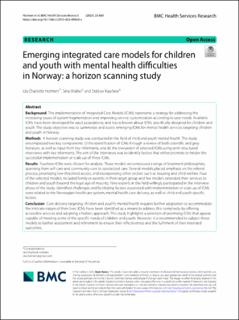| dc.contributor.author | Holmen, Ida Charlotte | |
| dc.contributor.author | Waibel, Sina | |
| dc.contributor.author | Kaarbøe, Oddvar Martin | |
| dc.date.accessioned | 2023-12-21T13:02:17Z | |
| dc.date.available | 2023-12-21T13:02:17Z | |
| dc.date.created | 2023-10-10T14:49:13Z | |
| dc.date.issued | 2023 | |
| dc.identifier.issn | 1472-6963 | |
| dc.identifier.uri | https://hdl.handle.net/11250/3108614 | |
| dc.description.abstract | Background
The implementation of Integrated Care Models (ICMs) represents a strategy for addressing the increasing issues of system fragmentation and improving service customization according to user needs. Available ICMs have been developed for adult populations, and less is known about ICMs specifically designed for children and youth. The study objective was to summarize and assess emerging ICMs for mental health services targeting children and youth in Norway.
Methods
A horizon scanning study was conducted in the field of child and youth mental health. The study encompassed two key components: (i) the identification of ICMs through a review of both scientific and grey literature, as well as input from key informants, and (ii) the evaluation of selected ICMs using semi-structured interviews with key informants. The aim of the interviews was to identify factors that either promote or hinder the successful implementation or scale up of these ICMs.
Results
Fourteen ICMs were chosen for analysis. These models encompassed a range of treatment philosophies, spanning from self-care and community care to specialized care. Several models placed emphasis on the referral process, prioritizing low-threshold access, and incorporating other sectors such as housing and child welfare. Four of the selected models included family or parents in their target group and five models extended their services to children and youth beyond the legal age of majority. Nine experts in the field willingly participated in the interview phase of the study. Identified challenges and facilitating factors associated with implementation or scale up of ICMs were related to the Norwegian healthcare system, mental health care delivery, as well as child and youth specific factors.
Conclusion
Care delivery targeting children and youth’s mental health requires further adaptation to accommodate the intricate nature of their lives. ICMs have been identified as a means to address this complexity by offering accessible services and adopting a holistic approach. This study highlights a selection of promising ICMs that appear capable of meeting some of the specific needs of children and youth. However, it is recommended to subject these models to further assessment and refinement to ensure their effectiveness and the fulfilment of their intended outcomes. | en_US |
| dc.language.iso | eng | en_US |
| dc.publisher | BMC | en_US |
| dc.rights | Navngivelse 4.0 Internasjonal | * |
| dc.rights.uri | http://creativecommons.org/licenses/by/4.0/deed.no | * |
| dc.title | Emerging integrated care models for children and youth with mental health difficulties in Norway: a horizon scanning study | en_US |
| dc.type | Journal article | en_US |
| dc.type | Peer reviewed | en_US |
| dc.description.version | publishedVersion | en_US |
| dc.rights.holder | Copyright 2023 The Author(s) | en_US |
| dc.source.articlenumber | 860 | en_US |
| cristin.ispublished | true | |
| cristin.fulltext | original | |
| cristin.qualitycode | 2 | |
| dc.identifier.doi | 10.1186/s12913-023-09858-x | |
| dc.identifier.cristin | 2183433 | |
| dc.source.journal | BMC Health Services Research | en_US |
| dc.identifier.citation | BMC Health Services Research. 2023, 23 (1), 860. | en_US |
| dc.source.volume | 23 | en_US |
| dc.source.issue | 1 | en_US |

